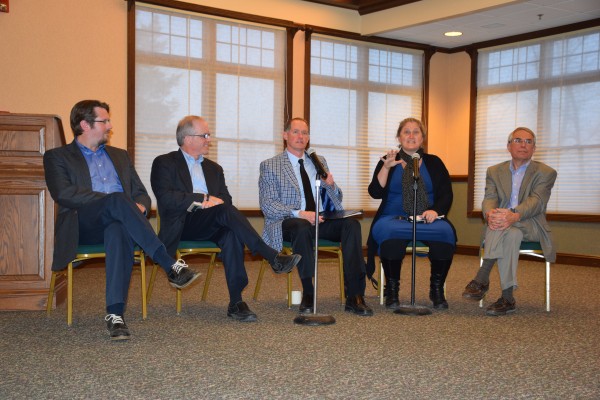Chautauqua Presents Documentary, Hosts Expert Panel

Thursday night’s panel of experts came from all over the United States and from various backgrounds in ethics, biochemistry, medicine and theology. From left are Jason T. Eberl, Marian University, Eric M. Meslin, Indiana University, Nathan Day-Wilson, Chautauqua-Wawasee, Regan Brashear, Making Change Media and Ronald Cole-Turner, H. Parker Sharp.
Chautauqua-Wawasee had a great turnout for its first official event for the new season, hosted by Executive Director Nathan Wilson.
“Fixed: The Science/Fiction of Human Enhancement,” is a documentary seven years in the making, presented by Chautauqua and a panel of experts on the ethics, evolution and overall effects of human modifications through new and developing technologies.
Event guests enjoyed dinner and a meet and greet at the Oakwood Hilltop Event Center from 6 p.m. to 10 p.m. Thursday.
“Fixed” examined the ethical reasons for choosing to use bionic limbs and human enhancement versus living with disabilities. Beyond the decision to support or oppose the use of such human enhancements, are many more underlying questions.
What does it mean to be human? When is technology too much? What is ethical?
The documentary explored the ideas of several scientists in varying fields such as biochemistry, transhumanism, osteopathic medicine and bioethics. Although each expert had a different knowledge, each of them were sharing their opinions based on a similar perspective — one of disablement.
These scientists were considered “disabled” in some way, although most chose to ignore that standard term. Most decided to view their disability as just a simple part of their lives, rather than something that needed to be fixed or improved upon.
Along with movie director Regan Brashear, Chautauqua-Wawasee also hosted a panel of experts on the subjects, including Jason T. Eberl, Marian University; Eric M. Meslin, Indiana University Center of Bioethics and School of Medicine; Ronald Cole-Turner, professor of theology and ethics at H. Parker Sharp.
Following the movie, experts were able to discuss amongst themselves and with audience members various portions of the documentary. Each expert agreed the movie was inspirational at the least.
“I was incredibly moved by the movie in a couple ways,” said Meslin. “You had me at the opening credits,” he laughed. Brashear also spoke about the long process to make it, speaking with hundreds of researchers. “The heart of the film was in the ‘fixed’ part,” said Brashear. ‘Of course if something’s broke, you want to fix it, right?”
The audience seemed just as captivated as the expert panel with the colorful displays and personal accounts from each disabled speaker presented on the film. Several “amens” came from movie onlookers who found many all-too-true statements. The documentary addressed the increasing gap between those who could afford bionic limbs for enhancements, whether for fun or necessity, and those who cannot even afford the newly mandated health care.
“I think we try to understand complexity by breaking it down into simple pieces, and this is complex,” said Meslin.
Wilson ended the night by thanking everyone who joined in the event, and promised many more upcoming features for the Chautauqua calendar. For more information on events hosted by Chautauqua, visit chautauqua-wawasee.org.
- Megan McClellan, Syracuse-Wawasee Trails director, right, speaks with Linda and Rich Thrapp, Oakwood board member, about the upcoming trails in the area. During dinner, guests were able to walk around and speak with members of the community. McClellan was even able to point out some favorite trails on a map to a couple of local women.
- The audience sat raptly listening as experts began to discuss a broad range of topics, stemming from the presentation of the documentary “Fixed.” The guests later had a chance to add their own ideas and questions to the discussion, and meet each member of the panel.


